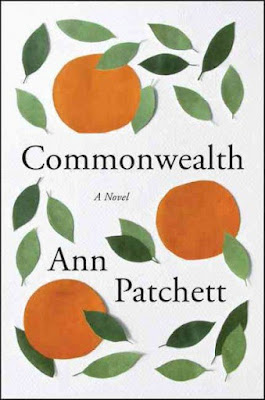Jon Appleton worked in-house in publishing for 20 years and has been a buyer for a book club, reviewer and speaker on children's books and publishing. He is now a freelance editor and writer with a particular interest in helping new authors pitch and publish their work. His debut novel, Ready to Love, was released in Summer 2016, and he blogs regularly on writers and writing at https://jonappletonsbooks.com/.
It’s for her novels with exotic locations – Bel Canto (set in South America) and State of Wonder (along the Amazon) –
that Ann Patchett is best-known for winning prestigious prizes. But
everyone should read the books that are set in more familiar territory, her own
United States, and you should start with her seventh novel, Commonwealth.
It’s the story of two families fused together
as the result of a kiss at the christening of Franny Keating back in 1964.
Marriages fracture and reform, but most significantly of all, a brood of six
children coheres into a tribe and their feral bonds exist independently of
(though of course also influenced by) their parents’ divorces and remarriages
and inevitable ageing. For fifty years, until the present day.
Commonwealth
is a big novel – there are a lot of characters, a lot of time is covered, and
the title itself promises vastness. Just as Run
(an earlier Patchett novel) is a beautiful word, so too is Commonwealth, which in America describes
Virginia, one of the two key locations in the book, a designated ‘commonwealth’
state. Of course, it also conveys the common wealth of a family with its
secrets, betrayals, punishments, tragedies and the rest, that burden and
enlighten members in different ways. At the heart of the novel is the devastating
death of a child, but that’s nearly eclipsed by a great betrayal, spurred by
Franny and her relationship with a much older man, a writer called Leo Posen,
who turns the family story into a bestselling novel – called Commonwealth – which forces all the
children to confront the chronology and interpretation of their lives.
Although the canvas is large, it’s not an epic
novel. Ann Patchett scoops chunks of time out of the narrative, and drops us
back into stories at their end, or at the beginning of the next one. (It’s no
surprise to learn she has a file of off-cuts – whole deleted scenes which she
removed, with the proviso that she could reinstate them if required – which
didn’t happen). You need to backtrack at
times and remember which sibling belongs to whom and where they’ve ended up and
what they recall. But her touch is light and her movements skilful so we have
complete faith in her ability to carry us through the years.
Patchett’s great skill is her ability to
illuminate her subject from all sides with a kind of ‘admiration and disbelief’
as she writes in this novel. (Perhaps all her books could be called State of Wonder.) Here’s how Patchett
describes Franny’s relationship, at 29, with the much older novelist:
‘After all this time he could not believe that
she was with him: not only was she young (not just younger but categorically young) and more beautiful than he had
any right to deserve at this point, but she was the cable on which he had
pulled himself hand over hand back into his work: she was the electricity, the
spark. Franny Keating was life. For
her part, Franny could say the name Leon
Posen, like she was saying Anton
Chekhov, and find him there in the bed beside her. It did not cease to be
astonishing with time. And more than that, he had found her life meaningful
when she could make no sense of it at all.’ She goes on to tell us, ‘Which is
not to say they were without problems …’
There are plenty of stories about novelists
out there but what is most interesting about Commonwealth is that it really is, apparently, faithful to the
story of Ann Patchett’s own parents’ divorces and remarriage. She wrote the
book because she felt that until she’d addressed her own story she’d be unable
to develop new fictional worlds. Patchett is Franny, who is as laconic and
bitingly funny as Patchett appears when she writes in her own voice in works of
non-fiction such as This Is the Story of
a Happy Marriage (which, incidentally, contains ‘The Getaway Car’ which is
the best account of a writer’s journey I’ve ever read).
Of all the books published in 2016 Commonwealth is the novel I was most
looking forward to, and (with two months to go) I can safely say it’s my book
of the year.

No comments:
Post a Comment